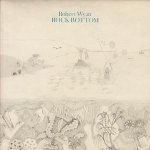
Robert Wyatt Rock Bottom
(Domino)
The songs that make up the nucleus of Rock Bottom had already been written before Robert Wyatt hit a rock bottom of his own, falling out of a fourth floor window on an early summer evening in 1973. The fall broke his spine, leaving him paralyzed and subjected to eight months of hospitalization. During this period, the songs he’d written became something new, a response to his newfound circumstances and the realization, in Wyatt’s words, “The loss of my legs might give me a new kind of freedom.” Rock Bottom was produced by Pink Floyd’s Nick Mason and released, to great acclaim, in 1974.
Thirty-four years later, and Rock Bottom is newly reissued by Domino Recordings without any frills, extra tracks or extensive liner notes. There is a modest history of the record, penned by Wyatt’s hand in 1998 (likely for the last reissue treatment the record received by Rykodisc), and a lyric sheet. Otherwise, the music is the draw and that’s more than enough.
Reexamining the boundless shapes and sizes presented within the six tracks that make up Rock Bottom, it’s amazing that a life experience so substantial and seemingly hopeless as Wyatt’s could almost work in his favor. It’s as if to say, with a straight face, that a pair of working legs could possibly stifle one’s creativity. Or, taken less literally, that being forced outside of a comfort zone can lead to an album this mesmerizing, beautiful and, at times, unsettling. The first few piano notes of Sea Song almost sound like the introduction to some light-hearted Randy Newman sing-along, a feeling that quickly shifts once Wyatt begins singing his soft, melancholic poetry: “Your lunacy fits neatly with my own/My very own/We’re not alone.”
Not that the album shies away from the familiarity of progressive or fusion jazz from the era, but Wyatt’s deep persona and expressive intimacy seem to spread to his players, allowing them all to open up as intimately with their instruments in the most fluid way. Time signatures, syncopation…the mathematics matter very little and the elements, when combined, are gorgeously thick and faraway. The minimal instrumentation on Last Straw for instance sounds damn near orchestral, light cymbal percussion and earthly piano glued together by Wyatt’s melodies, followed by the blaring and overlapping trumpets that open Little Red Riding Hood Hit the Road. Songs flow so brilliantly it’s hard to imagine that they weren’t played in one session.
The medley, Alifib/Alife, begins like a soft, synth infused Return To Forever or Weather Report track, a Jaco-contender of a bass solo (Hugh Hopper) tap-dancing on the slow foundation. The mood slowly grows somber as Wyatt sings, transitioning to the second act where the song melts into a sinister and maddening free jazz piece, Gary Windo sporadically pushing wind through his sax over the buzzing of a perpetual keyboard. Wyatt revisits his lyrics, this time reading them aloud with creepy coffeehouse inflections, hand drums bringing the spoken word environment to mind. His wife, Alfreda Benga, closes the song with an additional poem delivered with same abrupt and jagged enunciation.
Ending with Little Red Robin Hits the Road, progressive guitarist Mike Oldfield makes his six-string sing over marching snares and walls of angelic synth, leading into a rolled percussive storm of a climax before the song fades into Fred Frith’s viola and Ivor Cutler’s absurd recitation of an amusing poem about a phone. The album ends with its first and only laugh.
With Rock Bottom, Wyatt transcends the typical definitions of “introspection” and “life-affirmation” by being indirect and allowing his mood and music to speak for him. Eschewing the insipid and trite stories of life’s challenges, Wyatt’s physical disability cultivated a grand form of expression and Nick Mason evidently knew how to pull it all together. A deserving classic being kept in circulation. Thank you, Domino.
